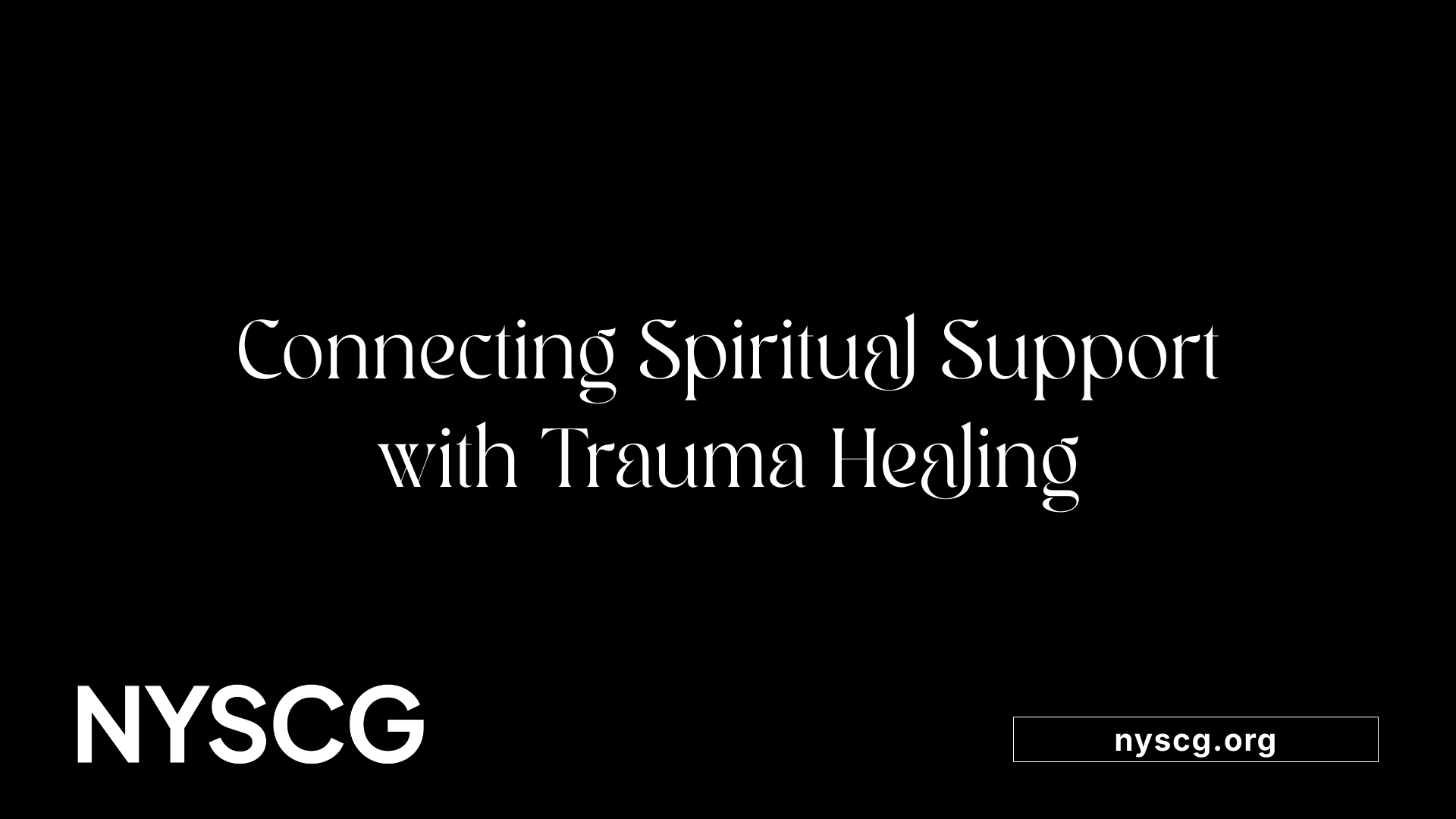Spiritual Debriefings After Critical Incidents: A Field Guide


In the aftermath of critical incidents, healthcare professionals face complex emotional and spiritual challenges. Incorporating spiritual debriefings into post-incident care is pivotal for fostering resilience, supporting mental health, and nurturing holistic recovery. This field guide explores effective practices, key frameworks, and the nuances of integrating spiritual support into trauma response, ensuring that caregivers can navigate these intense moments with compassion and purpose.

Spiritual debriefing plays a vital role in supporting healthcare professionals who have experienced emotionally intense or traumatic events. Its primary purpose is to offer emotional and spiritual reinforcement, helping staff make sense of their experiences and process complex feelings related to the incident.
During a spiritual debriefing, trained facilitators guide team members through reflective conversations that encourage emotional expression, grief sharing, and spiritual reflection. This structured environment fosters mental well-being and resilience, which are crucial when dealing with the emotional toll of patient suffering, death, or sudden crises.
The process involves creating a safe space where healthcare workers can openly discuss their reactions and spiritual concerns. Techniques such as moments of silence and guided discussions help staff honor the memory of patients and support their emotional and spiritual recovery.
Facilitators assist participants in exploring their feelings, spiritual questions, or doubts, which promotes a profound sense of connection and understanding among team members. Such discussions can also highlight personal coping strategies and spiritual practices that may ease emotional burdens.
Absolutely. By addressing emotional and spiritual needs proactively, debriefings help reduce feelings of isolation, guilt, or helplessness that often lead to burnout or moral distress. They reinforce the importance of self-care, compassion, and team cohesion.
Regular spiritual debriefings contribute to fostering a resilient healthcare team that is better equipped to handle ongoing emotional challenges. Overall, these sessions support long-term mental health, reinforce ethical practice, and sustain compassionate care even in the face of distressing events.

Spiritual resources play a significant role in helping individuals heal from trauma. They offer a foundation of purpose and belonging, which are essential for resilience. When trauma survivors connect with spiritual practices like prayer, meditation, or rituals, they often find a sense of peace and comfort that aids in processing difficult emotions.
Incorporating spirituality into therapeutic approaches, such as spiritual direction or transpersonal therapy, fosters inner growth and spiritual transformation. These practices help individuals reshape their life narratives, shifting from feelings of victimization toward empowerment and hope.
Spirituality also enhances community building, providing social support that reduces feelings of isolation. Being part of a spiritual or faith-based community can strengthen resilience by offering shared hope and collective strength.
Overall, spiritual support nurtures hope, perseverance, and personal development, acting as a bridge for trauma survivors to find meaning in their experiences and build a resilient outlook for the future.

When supporting healthcare professionals after challenging or traumatic incidents, incorporating spiritual debriefings can be a valuable way to promote healing and resilience. Effective spiritual debriefings should begin with creating a safe and respectful environment. This setting must honor cultural, spiritual, and individual differences, fostering open communication without judgment.
It is crucial to involve facilitators who are trained in spiritual care and sensitive to diverse beliefs. These professionals can guide participants through reflective processes that deepen personal understanding and connection to their faith or spiritual values.
Using reflective questions based on frameworks like FICA (Faith, Importance/Influence, Community, Address/Action) helps individuals assess their spiritual health. These questions can explore personal faith, the significance of spiritual beliefs in coping, the support of community, and spiritual actions they might take.
The process may include elements like prayer, Scripture reading, or meditation, tailored to the participants' spiritual backgrounds. The goal is to facilitate a process of humility and reliance on divine strength, enabling individuals to find meaning in their experiences.
Approaching spiritual debriefings with humility is vital. They should avoid manipulation, respecting each person's spiritual journey. Support from the larger community or organization can foster ongoing spiritual well-being, ensuring that healthcare workers feel supported both in their professional and spiritual lives.
Adhering to these principles ensures that spiritual debriefings serve as a respectful, supportive space that encourages growth, resilience, and inner peace after difficult events.
Post-incident support for healthcare professionals involves complex emotional and spiritual dimensions. Frameworks and methodologies play a vital role by offering structured, culturally sensitive approaches that guide providers in helping individuals process their trauma.
These approaches focus on assessing spiritual needs and struggles, which can include addressing feelings of moral injury, grief, or crisis of faith. Recognizing these issues firsthand allows caregivers to tailor support strategies that respect personal beliefs and cultural backgrounds.
In addition to spiritual assessment, established frameworks promote safety and foster trust. For instance, trauma-informed care emphasizes creating a safe environment where healthcare workers feel secure to share their feelings and experiences without judgment. This foundation encourages openness and facilitates healing.
Methodologies such as mindfulness-based interventions, peer support groups, and cognitive-behavioral techniques integrate seamlessly into trauma recovery processes. They help individuals develop resilience, promote emotional regulation, and cultivate a sense of purpose afterward.
Furthermore, these structured approaches assist in navigating complex issues like religious trauma, moral injury, and faith shifts. They ensure a respectful dialogue that recognizes diverse spiritual beliefs, thus honoring individual recovery journeys.
Overall, strategic frameworks enable healthcare providers to deliver compassionate, comprehensive care addressing both spiritual and emotional recovery. This integration supports healing, fosters resilience, and restores a sense of well-being after critical incidents.
For further understanding, searching the term 'frameworks supporting post-incident spiritual care' can provide additional insights into these methods and their implementation in healthcare settings.
Different approaches to trauma debriefing show notable variation depending on the context—whether in healthcare, organizational, or mental health environments.
In healthcare settings, debriefing often occurs after critical incidents such as patient death or unexpected events. These sessions are usually voluntary, informal, and focused on emotional expression, team cohesion, and stress relief. Facilitators like social workers or spiritual care practitioners guide these discussions, which are typically held within a short time frame—often within 72 hours—aiming to mitigate burnout and promote resilience.
In contrast, mental health care has adopted trauma-informed models that emphasize creating safe, supportive environments. Examples include the Six Core Strategies and the Sanctuary Model, which seek not only immediate emotional support but also long-term safety and recovery. These frameworks focus on reducing retraumatization, fostering trust, and promoting ongoing emotional well-being, often involving structured interventions that extend beyond initial debriefing.
In organizational contexts, debriefing can include structured simulation-based training where individuals reflect on their performance and emotional responses. This might involve self-debriefing, group debriefings, or a combination. Evidence suggests that combining individual and group reflection often results in better learning outcomes and deeper emotional processing.
While trauma-informed approaches tend to prioritize long-term safety, ongoing emotional support, and systemic change, traditional debriefing methods primarily aim to enhance immediate understanding, skills, and emotional processing related to specific incidents.
| Aspect | Healthcare Settings | Organizational & Mental Health Models | Focus | Timing | Approach |
|---|---|---|---|---|---|
| Structure | Voluntary, informal, facilitation by trained staff | Structured, systemic frameworks like Sanctuary Model | Emotional support, team cohesion | Short-term (within days) | Focused on incident-specific recovery |
| Long-term Goals | Resilience, burnout prevention | Safety, systemic change, ongoing recovery | Safety and emotional well-being | Ongoing, systemic | Emphasizes systemic safety, trust, and trauma prevention |
Integrating principles from both approaches—like trauma-informed care and varied debriefing techniques—can greatly enhance safety, learning, and emotional support across healthcare and organizational environments.
A wide array of educational resources and training materials are accessible for those interested in mastering debriefing methods. These resources often include detailed manuals, online courses, and structured facilitator training programs designed to improve skills in leading effective debriefings.
Various models are covered within these training materials, such as the plus-delta method, which encourages reflection on what went well and what could be improved, the three-phase debriefing process, and more comprehensive frameworks like PEARL and TeamGAINS. These models help facilitators create safe, structured environments that promote honest communication and learning.
Supporting facilitator development is a major focus of these resources to ensure psychosocial safety for all participants. This includes guidance on recognizing emotional reactions, maintaining confidentiality, and creating an open, supportive space.
Many training programs utilize audiovisual tools like Viso to enhance engagement and understanding. They emphasize building facilitator confidence in managing group dynamics and handling sensitive topics carefully. Practical guidance often covers co-facilitation strategies, managing challenging reactions, and ensuring that debriefings are both supportive and productive.
Organizations, including healthcare institutions and educational bodies, can access these materials to implement robust debriefing protocols. This ensures healthcare professionals, educators, and other practitioners are well-equipped to support emotional recovery and continuous improvement following critical incidents.
In summary, abundant resources are available to assist facilitators in applying effective debriefing techniques, fostering a culture of reflection, learning, and emotional support in high-stakes environments.
Supporting healthcare workers after a critical incident involves more than just addressing emotional and physical reactions. It is crucial to recognize individual cultural and spiritual backgrounds during debriefing and recovery processes. Each person's beliefs and practices can influence how they cope with trauma.
Understanding and respecting personal values, religious faiths, and cultural norms help tailor support that feels meaningful and respectful. For many, spirituality offers comfort, hope, and a sense of purpose in healing. Spiritual resources such as prayer, meditation, or rituals can be integrated into support strategies when aligned with the individual’s wishes.
Trauma can also pose spiritual challenges, leading to doubts or struggles with faith. These spiritual dilemmas can deepen distress if not addressed with sensitivity. Collaborating with faith leaders, chaplains, or spiritual advisors can provide additional support and help navigate complex spiritual concerns.
Healthcare providers should routinely assess spiritual needs as part of holistic care. This involves open, non-judgmental conversations about beliefs, values, and spiritual struggles. Tailoring post-incident interventions to include culturally appropriate practices can foster resilience and aid in recovery.
Ultimately, embracing the diversity of spiritual and cultural identities enhances support efforts, making healing more inclusive and effective. This approach aligns with the overall goal of trauma recovery: restoring well-being while honoring each person's unique background and belief system.
Effective spiritual debriefing is a vital component of holistic trauma care, especially in healthcare settings where emotional and spiritual exhaustion are common. By integrating evidence-based frameworks, respecting cultural and spiritual diversity, and maintaining a compassionate, skilled facilitation approach, healthcare providers can foster resilience and healing. Recognizing the diversity of spiritual needs and engaging in ongoing education ensures that support remains relevant and sensitive. As organizations develop policies and training around spiritual debriefings, they build a foundation of safety and trust that empowers staff to process grief, trauma, and moral injury with dignity. Ultimately, fostering a culture that champions both psychological and spiritual well-being enhances not only individual recovery but also organizational resilience, ensuring that caregivers are supported in their vital roles during times of crisis.
All you need is the will to make the world a better place.
New York State chaplain group inc. is a tax deductible organization with a federal tax Id number 92-383-4921